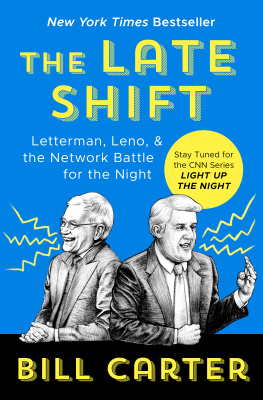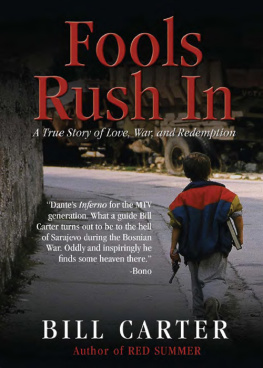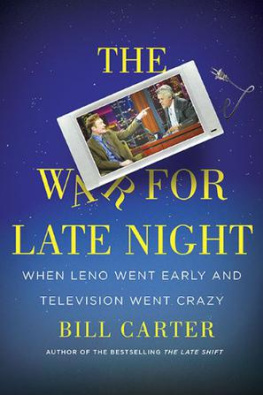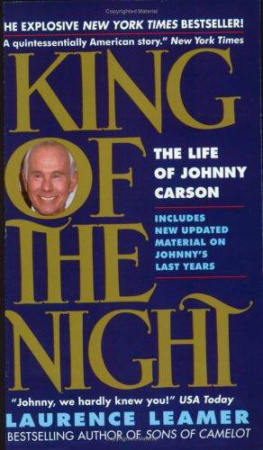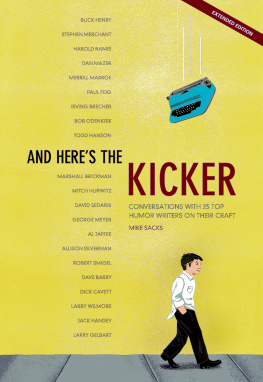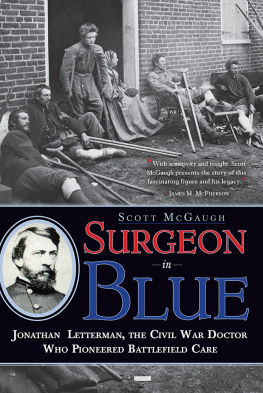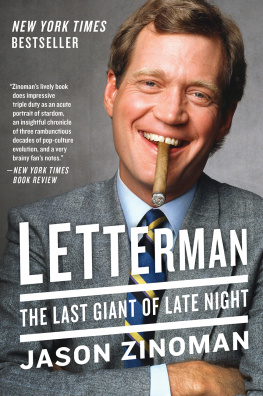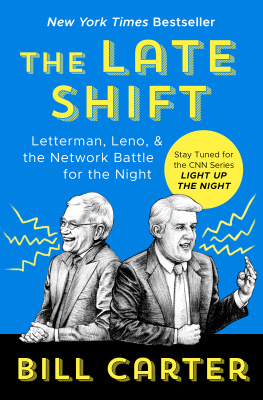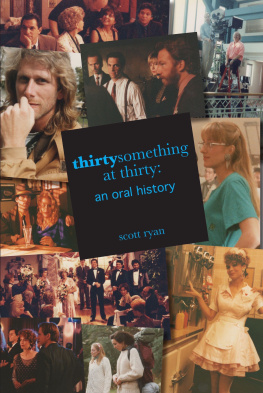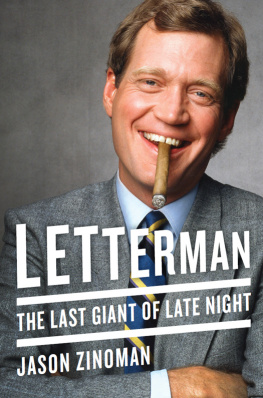Bill Carter - The Late Shift: Letterman, Leno, & the Network Battle for the Night
Here you can read online Bill Carter - The Late Shift: Letterman, Leno, & the Network Battle for the Night full text of the book (entire story) in english for free. Download pdf and epub, get meaning, cover and reviews about this ebook. genre: Detective and thriller. Description of the work, (preface) as well as reviews are available. Best literature library LitArk.com created for fans of good reading and offers a wide selection of genres:
Romance novel
Science fiction
Adventure
Detective
Science
History
Home and family
Prose
Art
Politics
Computer
Non-fiction
Religion
Business
Children
Humor
Choose a favorite category and find really read worthwhile books. Enjoy immersion in the world of imagination, feel the emotions of the characters or learn something new for yourself, make an fascinating discovery.
- Book:The Late Shift: Letterman, Leno, & the Network Battle for the Night
- Author:
- Genre:
- Rating:4 / 5
- Favourites:Add to favourites
- Your mark:
- 80
- 1
- 2
- 3
- 4
- 5
The Late Shift: Letterman, Leno, & the Network Battle for the Night: summary, description and annotation
We offer to read an annotation, description, summary or preface (depends on what the author of the book "The Late Shift: Letterman, Leno, & the Network Battle for the Night" wrote himself). If you haven't found the necessary information about the book — write in the comments, we will try to find it.
Bill Carter: author's other books
Who wrote The Late Shift: Letterman, Leno, & the Network Battle for the Night? Find out the surname, the name of the author of the book and a list of all author's works by series.
The Late Shift: Letterman, Leno, & the Network Battle for the Night — read online for free the complete book (whole text) full work
Below is the text of the book, divided by pages. System saving the place of the last page read, allows you to conveniently read the book "The Late Shift: Letterman, Leno, & the Network Battle for the Night" online for free, without having to search again every time where you left off. Put a bookmark, and you can go to the page where you finished reading at any time.
Font size:
Interval:
Bookmark:


Letterman, Leno, & the Network Battle for the Night
Bill Carter

David Letterman dashed across the stage at the Ed Sullivan Theater in preparation for his introduction on his CBS late-night show one last time on the evening of May 20, 2015.
It was the 4,214th show he had hosted on CBS; his 6,028th late-night show, including his eleven-year run on NBC. He wore glasses on the air now, his hair was close-cropped and wispy white, but he was trim and fit and ramrod straight as he strode out in a dark suit, white shirt, and blue, design-flecked tie.
The audience stood to cheer and applaud as announcer Alan Kalter read out the uniquely Letterman-esque intro one last time: And now from a small town in Indiana
The applause peaked at the sound of his name, washing over him with the kind of unrestrained devotion show business figures attain after they have transitioned from star, past icon,and on to being an irreplaceable part of millions of lives. The ovation soared and refused to ebb, as though the audience could not willingly relinquish this last opportunity to give voice to their affection, until Letterman himself, typically self-conscious and uncomfortable with excess, all but begged for it to end: Thats it; stop it right there.
Finally, he got them to sit, ready for closing night to begin. With a monologue of course. And heres how he opened his final show:
Ill be honest with you. Its beginning to look like Im not going to get the Tonight show.
Jay Leno had his own farewell to late night fifteen months earlier. He was accompanied by a similarly rapturous greeting from his audience, which, in his case included many friends and family of the show and its crew.
Leno, in his own dark suit and blue tie, his hair still richly thick but now a cumulous shock of white, had his moment at center stage with a standing crowd unwilling to let the final show commence. And he did his own self-referential opening joke:
I dont like goodbyesNBC does, but I dont care for them.
This was his parting shot at his inconstant network for sliding him out of the Tonight chair five years earlier in the effort to install Conan OBrien as successor. Having clawed his way back into the job he had not wanted to surrender, and back to the top of the ratings, as had been the overweening raison dtre of his Tonight tenure, Leno had every reason to revel in a career-long success.
But reveling was never Lenos way. He liked to say he didnt believe in looking back. He had never even allowed NBC to produce a prime-time special of his best work. (CBS did four of them for Letterman.) So he didnt do a slew of retrospective jokes, except for an allusion to one of his favorite themes:
So much has happened. You know the saddest part? O.J. never found the real killer.
The night did not pass without the inevitable reference, however. It fell to a guest, Sheryl Crow, to deliver it in a parody of the song from The Sound of Music , (a new version of which had been produced live on NBC two months earlier):
So long, farewell, I give a little wave, Crow sang. But not for JayI want to get on Dave.
In the twenty-plus years after David Letterman did not get the Tonight showand Jay Leno didthe world changed of course, in too many ways and too profoundly to easily assess. For the television business the two men served so enduringly, the changes were convulsive. Not only did fewer people watch the shows the two stars had headlined for two decades, but fewer and fewer people even watched a thing called television.
The show that had been the centerpiece of their endlessly intersecting lives, NBCs Tonight show, rolled on under its talented new star, Jimmy Fallon. But it had become surrounded by a flock of clone-like creatures arrayed across the late-night landscape. Almost all of them owed something to Letterman and Lenonot to mention Steve Allen, Jack Paar, Dick Cavett, Jon Stewart, and, of course, Johnny Carson.
Virtually all the new hosts still told opening monologues, sat behind desks, talked to celebrities, introduced music acts, and said goodnight. And they were almost always men.
But the thing that had distinguished the Tonight show enough to inspire metaphors of royal succession and a king on a throne was lost to time. An entire generation had entered the world and experienced American culture not knowing why the Tonight show was a franchise, any different from all those other shows with hosts and guests and couches. They had not seen Johnny Carson, had no idea of the towering impact he had had on the entertainment world, and especially on every comic of Letterman and Lenos generation.
Nor why the pursuit of his vacated chair behind the host desk would become the consuming enterprise in the lives of two hungry, driven men, one that neither of them were to ever fully let go of.
And because the chase was so public between two guys who had grown up in comedy together, contemporaries, friends, inspirations for each others success, and because they were each so talented and appealing, it was all but impossible for much of America to look away, to be disinterested in either the outcome or the psychological fallout.
The link between them was simply indelible. During the 2010 Super Bowl, early in the second quarter, a fifteen-second promotion spot rolled: Letterman sitting on a couch, curmudgeon-faced, eating chips, complaining about being at the worst Super Bowl party ever. Next to him on the couch, revealed as the shot expanded, Oprah Winfrey was shaking her head. And as the shot expanded further, there was Leno, eating his own chip and declaring, Oh, hes just saying thatcause Im here.
The gobsmacked reaction reached all the way to the White House, where an amazed President Obama had asked his close aide David Axelrod to see if he could find out if what they had just seen was for real. He emailed Jay who told him, yup, he and Dave had gotten together for a little surprise in the middle of the biggest TV show of the year.
Did Dave ever get over it?
His achievement was indisputable: Before Letterman left NBC to set up shop at CBS in 1993, no late-night show had ever seriously challenged the supremacy of Tonight , let alone beat it, as Letterman did for his two opening years at CBS. Nor had any other network ever established a late-night franchise that endured past its original host. Dave established two: his own, passed on to Stephen Colbert, and the 12:35 edition, passed on to James Corden.
More than that, Letterman put a personal stamp on late night that was no worse than second to that of Johnny Carson. A generation of viewersand comicsidolized Dave for his innovative comedy and, in the later stages of his career, his often-brilliant interviewing. He was sui generis; an American original.
Still, in public he disparaged his contributions, labeling his show as frivolous, meaningless, a little dog and pony show. Late in his run he gave rueful-sounding interviews where he acknowledged that Jay had simply beaten him on the official scoreboard: the ratings. Why had that happened?
The answer is me, he said. Jay has wider appeal than I do.
Privately, Letterman was immensely proud of his body of work, and the people who worked for him knew it.
Font size:
Interval:
Bookmark:
Similar books «The Late Shift: Letterman, Leno, & the Network Battle for the Night»
Look at similar books to The Late Shift: Letterman, Leno, & the Network Battle for the Night. We have selected literature similar in name and meaning in the hope of providing readers with more options to find new, interesting, not yet read works.
Discussion, reviews of the book The Late Shift: Letterman, Leno, & the Network Battle for the Night and just readers' own opinions. Leave your comments, write what you think about the work, its meaning or the main characters. Specify what exactly you liked and what you didn't like, and why you think so.

